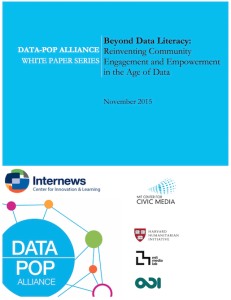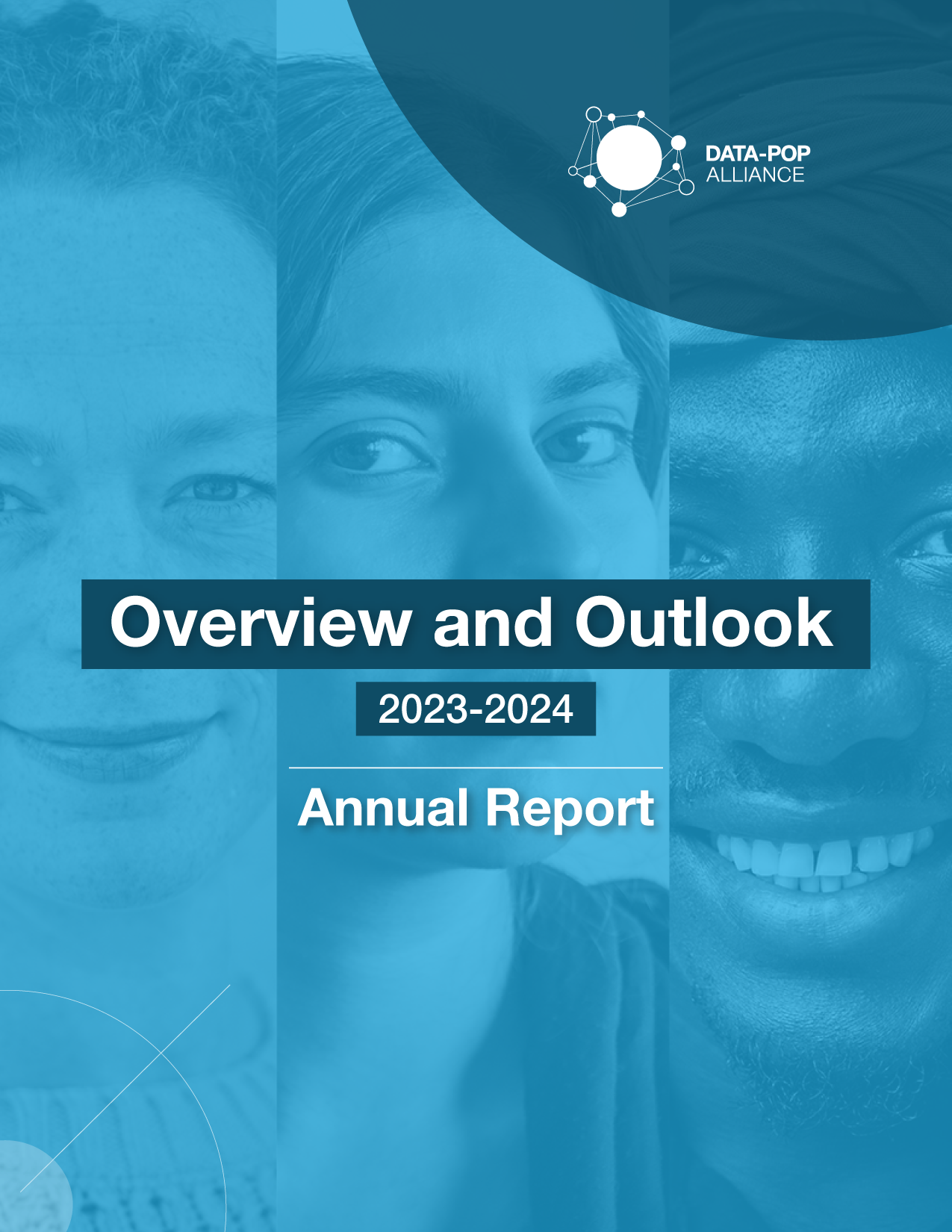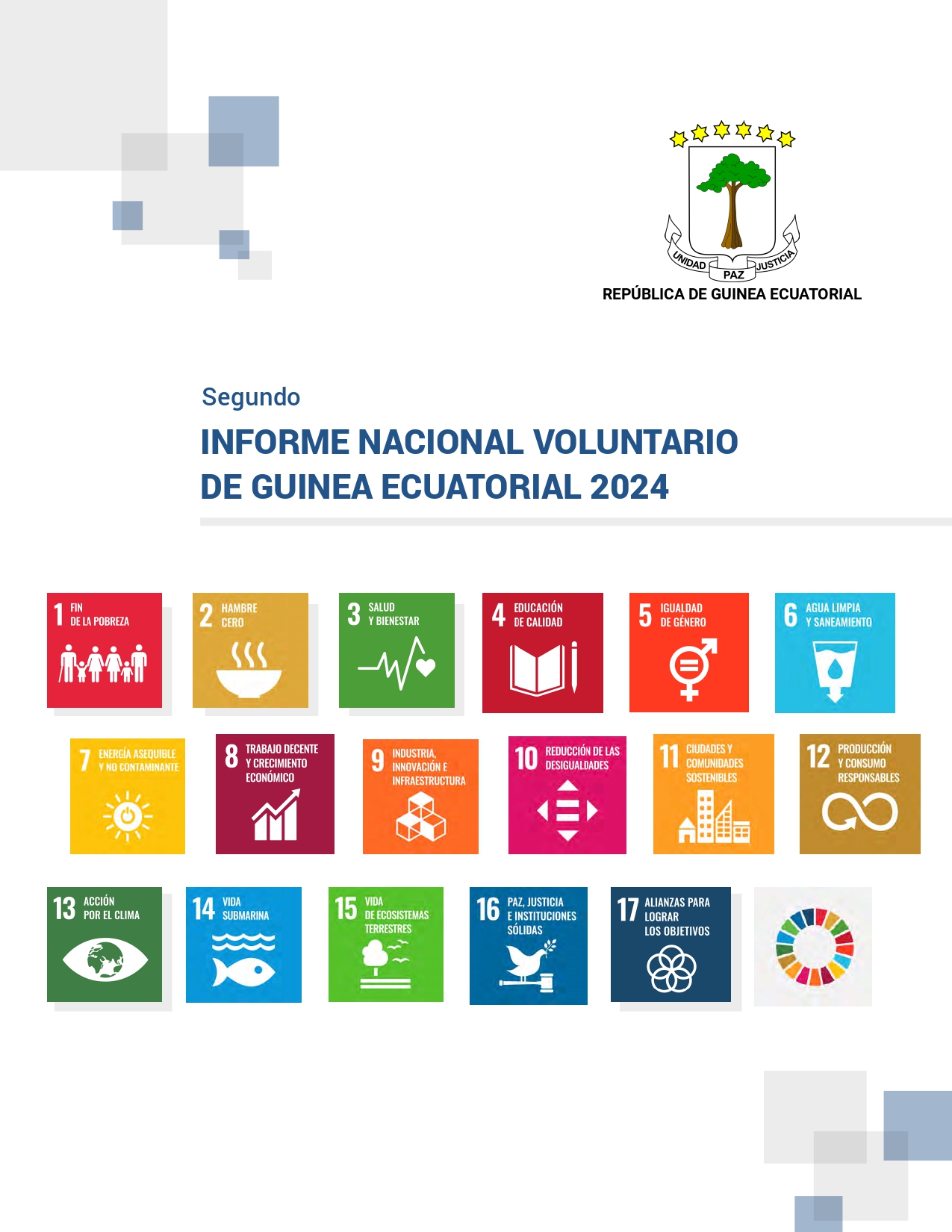
Data-Pop Alliance is excited to launch its Global Professional Training Program on Big Data and Sustainable Development, with funding from the Hewlett Foundation and in partnership with the United Nations System Staff College (UNSSC). The Program is part of our larger efforts to spur data literacy at all levels of society in support of the Sustainable Development Goals and social change, which also include academic and community-level components.
This professional training Program is implemented through 4-day capacity and community building workshops dedicated to development professionals—including policymakers and civil servants, civil society representatives, researchers, private sector employees working on social good projects as well as staff of non-governmental and international organizations. The program will be rolled out in up to 8 countries in 2016-17, including Colombia, Senegal, Rwanda, Kenya, Thailand, Ethiopia, and the US, leveraging the resources of our extended network of partners, Research Affiliates, team members and leadership at MIT and Harvard, as well as bringing in local experts from academia and other sectors.
Following an inaugural pilot held at MIT Media Lab in June, the first of these global workshops will be held in Bogotá, Colombia from November 29 – December 2, 2016. For more information and registration for the course, please visit: https://www.unssc.org/home/activities/leveraging-big-data-sustainable-development.
Why data literacy or “literacy in the age of data”
 A core priority of our work focuses on advancing global “data literacy,” which we define in a recent white paper as “the desire and ability to constructively engage in society through and about data.” There is a broad recognition that achieving the Sustainable Development Goals (SDGs), which underpin the larger 2015-2030 development agenda adopted by the 70th Assembly of the United Nations General Assembly in September 2015, requires building institutional and human capacities to measure, monitor, evaluate, and adjust policy outcomes against specific indicators.
As stated in the report “A World That Counts“, data literacy is key to unlocking a data revolution for development that can underpin and speed progress towards the recently agreed SDGs, and economic and political development at large. The current phenomenal explosion of data and analytics offers a historic opportunity to improve decision-making and coordination of policy agendas, as well as monitoring and accountability, at all levels.
Improving data literacy will require deepening specific capacity and specialized skills, blending knowledge from different academic disciplines (i.e. data science, statistics, social science, ethics, development studies, etc.), and fostering a culture around data and statistics that incentivizes empowerment and inclusion. Though existing programmes have begun to emerge, the design of these initiatives have largely lacked multi-stakeholder support (involving official statisticians, researchers, journalists and citizens), multi- disciplinary modular design, and regional contextualization.
Despite a call, in the “World That Counts” report, for “an education program aimed at improving people’s, infomediaries, and public servants’ capacity and data to break down barriers between people and data” (p. 3), to date no systemic action has been taken within or outside the UN to build awareness and skills amongst development professionals that are on the frontline of engaging with data. Many concerns and questions remain, including whether and how data are used to inform programming and advocacy activities, which kinds of data can and should be collected, when and by whom advanced analysis needs to be performed, how data can be communicated in a clear and effective way, and how partners in governments and civil society can begin to engage through and with data. Several UN organizations and departments have identified and expressed a clear need for training their staff in data analysis in general and Big Data in particular. Currently, this major capacity gap has not been met in a comprehensive and context-appropriate manner.
Data-Pop Alliance’s Global Professional Training Program with the United Nations System Staff College and the Hewlett Foundation
In this context, Data-Pop Alliance has designed and is rolling out a Professional Training Program with funding from the Hewlett Foundation in partnership with the United Nations System Staff College (UNSSC). The Program is implemented through 4-day workshops dedicated to UN staff, public officials, civil society representatives and other professionals including from the local private and academic sectors.
Their main objective is to build up participants’ awareness, skills and connections to engage with key applications and implications of Big Data in their work, and as citizens. The 4-day workshops will use mixed learning modalities including presentations, hands-on sessions, group work, a Data Expedition and project design. Though development of technical skills will be a major feature and objective—notably basic tools and techniques for exploring and manipulating data—the workshops will also place a strong emphasis on ethical and institutional dimensions, placing Big Data and the data revolution in historical and political perspectives.
The workshops are organized and offered as a UNSSC course—Leveraging Big Data for Sustainable Development—with a particular focus on public policy-making and implementation, and build on both traditional methods of data analytics as well as more recent applications such as mobile technology, crowdsourcing and big data. The broader and longer term objective is contributing to making the Big Data revolution people-centered – i.e. help shape the emerging Big Data ecosystem in ways that foster social progress and citizen empowerment across the globe, especially of poor and vulnerable communities. It is expected to be offered in up to 8 countries over 2016-17, including Colombia, Senegal, Rwanda, Kenya, Thailand, Ethiopia and the US.
The next course will be held in Bogotá from November 29 through December 2, 2016. In alignment with our mission to foster a strong, diverse Big Data communities in Colombia and elsewhere bringing together government, academia, private sector and civil society, Data-Pop Alliance will offer 20 Fellowships for participants of different sectors to participate free of cost, sponsored by the Hewlett-funded Program. These Fellows will contribute to the success of the workshops and Program more broadly through their sustained engagement within their local data ecosystems, where Data-Pop Alliance is developing long term projects and partnerships.
For more information and registration for the course, please visit: https://www.unssc.org/home/activities/leveraging-big-data-sustainable-development or contact training@datapopalliance.org.
A core priority of our work focuses on advancing global “data literacy,” which we define in a recent white paper as “the desire and ability to constructively engage in society through and about data.” There is a broad recognition that achieving the Sustainable Development Goals (SDGs), which underpin the larger 2015-2030 development agenda adopted by the 70th Assembly of the United Nations General Assembly in September 2015, requires building institutional and human capacities to measure, monitor, evaluate, and adjust policy outcomes against specific indicators.
As stated in the report “A World That Counts“, data literacy is key to unlocking a data revolution for development that can underpin and speed progress towards the recently agreed SDGs, and economic and political development at large. The current phenomenal explosion of data and analytics offers a historic opportunity to improve decision-making and coordination of policy agendas, as well as monitoring and accountability, at all levels.
Improving data literacy will require deepening specific capacity and specialized skills, blending knowledge from different academic disciplines (i.e. data science, statistics, social science, ethics, development studies, etc.), and fostering a culture around data and statistics that incentivizes empowerment and inclusion. Though existing programmes have begun to emerge, the design of these initiatives have largely lacked multi-stakeholder support (involving official statisticians, researchers, journalists and citizens), multi- disciplinary modular design, and regional contextualization.
Despite a call, in the “World That Counts” report, for “an education program aimed at improving people’s, infomediaries, and public servants’ capacity and data to break down barriers between people and data” (p. 3), to date no systemic action has been taken within or outside the UN to build awareness and skills amongst development professionals that are on the frontline of engaging with data. Many concerns and questions remain, including whether and how data are used to inform programming and advocacy activities, which kinds of data can and should be collected, when and by whom advanced analysis needs to be performed, how data can be communicated in a clear and effective way, and how partners in governments and civil society can begin to engage through and with data. Several UN organizations and departments have identified and expressed a clear need for training their staff in data analysis in general and Big Data in particular. Currently, this major capacity gap has not been met in a comprehensive and context-appropriate manner.
Data-Pop Alliance’s Global Professional Training Program with the United Nations System Staff College and the Hewlett Foundation
In this context, Data-Pop Alliance has designed and is rolling out a Professional Training Program with funding from the Hewlett Foundation in partnership with the United Nations System Staff College (UNSSC). The Program is implemented through 4-day workshops dedicated to UN staff, public officials, civil society representatives and other professionals including from the local private and academic sectors.
Their main objective is to build up participants’ awareness, skills and connections to engage with key applications and implications of Big Data in their work, and as citizens. The 4-day workshops will use mixed learning modalities including presentations, hands-on sessions, group work, a Data Expedition and project design. Though development of technical skills will be a major feature and objective—notably basic tools and techniques for exploring and manipulating data—the workshops will also place a strong emphasis on ethical and institutional dimensions, placing Big Data and the data revolution in historical and political perspectives.
The workshops are organized and offered as a UNSSC course—Leveraging Big Data for Sustainable Development—with a particular focus on public policy-making and implementation, and build on both traditional methods of data analytics as well as more recent applications such as mobile technology, crowdsourcing and big data. The broader and longer term objective is contributing to making the Big Data revolution people-centered – i.e. help shape the emerging Big Data ecosystem in ways that foster social progress and citizen empowerment across the globe, especially of poor and vulnerable communities. It is expected to be offered in up to 8 countries over 2016-17, including Colombia, Senegal, Rwanda, Kenya, Thailand, Ethiopia and the US.
The next course will be held in Bogotá from November 29 through December 2, 2016. In alignment with our mission to foster a strong, diverse Big Data communities in Colombia and elsewhere bringing together government, academia, private sector and civil society, Data-Pop Alliance will offer 20 Fellowships for participants of different sectors to participate free of cost, sponsored by the Hewlett-funded Program. These Fellows will contribute to the success of the workshops and Program more broadly through their sustained engagement within their local data ecosystems, where Data-Pop Alliance is developing long term projects and partnerships.
For more information and registration for the course, please visit: https://www.unssc.org/home/activities/leveraging-big-data-sustainable-development or contact training@datapopalliance.org. 



